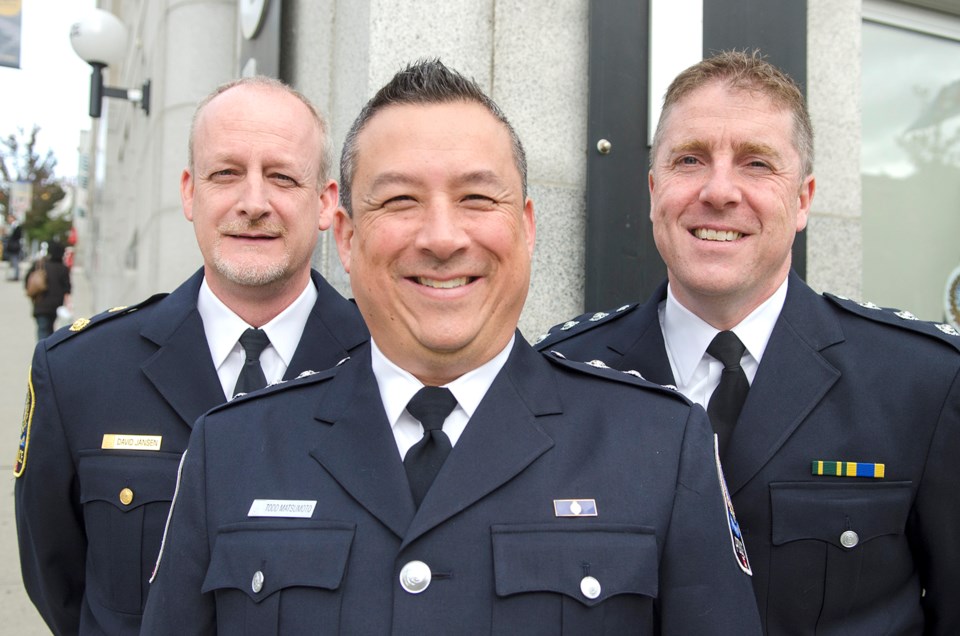It’s been many years since the New Westminster Police Department has seen a change quite like this one.
By Oct. 1, four out of the five top cops in the Office of the Chief Constable department will have retired making way for a new group of officers who will help lead the municipal police force into the future.
The first of four, Insp. Paul Hyland, moved into his new digs last November. Hyland oversees the patrol division, which also includes the Operational Support Unit (OSU or bike squad), the Integrated Canine Section, the traffic unit and commercial vehicle enforcement unit.
Insp. Todd Matsumoto is another relative newcomer to the Office of the Chief Constable. Matsumoto, who began his career with the department in ’92, was promoted to inspector earlier this month. He is in charge of Prevention Services and Administration Division.
Former Insp. Dave Jansen, meanwhile, took over for retiring Deputy Chief Const. Laurin Stenerson, who bid adieu to the department in June. Jansen joined the ranks of New Westminster’s finest in 1990 and has worked in a variety of positions. He was the first sergeant in charge of the bike squad, an initiative led by the now Chief Const. Dave Jones. He was also part of a community policing project that had officers assigned to different areas throughout the city in an effort to better serve the community.
But most of Jansen’s career was spent in the major crime section.
“I never expected I’d be an inspector, let alone a deputy chief. When I recognized the opportunity was coming and the chief approached me to talk about it, I certainly wanted to do it, and I wanted that challenge and I wanted to get it,” he said.
Together, Jansen, Matsumoto and Hyland are crafting a path for the department – not necessarily a new one, but one that takes into account the changing face of policing.
“It’s a very exciting time. Policing, in general, is getting younger,” Hyland said. “We’re seeing a huge increase in the numbers we’re recruiting and bringing in. So obviously, there’s generational gaps or generational ideas that can certainly be different.”
Hyland and Matsumoto admit the new generation of police officers have different values than their predecessors. Work and home life balance is especially important to many of the new recruits, whereas in the past it wasn’t uncommon to see officers working long hours or overtime, Hyland said.
“We’ve moved away from the paramilitary style structure of you’re the senior person and there’s a definite way of doing things based on seniority,” Hyland said.
“And I think, for us, that are of a different generation we have to see things from the perspective of the younger generation,” Matsumoto added.
This could mean a variety of things, but what Matsumoto stressed was that as managers, they need to recognize that some officers are happy with the positions they have rather than climbing the ranks.
Technology is another thing that has changed the way police departments operate. Most of the new officers are very comfortable with technology and social media, but it’s senior management’s job to keep up with the times and make sure their officers have the training and tools necessary to do their jobs effectively and efficiently.
“For our job really, I don’t think it’s so much about doing, but it’s about listening to what people need and facilitating that for them – getting them the equipment and the training they need to do their job, and hopefully, if along the way we can inspire and motivate them, then that’s certainly part of our objective,” Hyland said.
The trio are the first to admit they don’t know everything, but that’s OK, they said, because they’re looking to create an environment where lower-ranked officers feel comfortable coming to them with new ideas and strategies – something they themselves will be doing during the first year or two of their new position.
“While we may face some challenges where we may lack some managerial experience, I think it’s an exciting time where we can, perhaps, bring some new ideas to the table,” Hyland said.
“We’re doers, we like to go out and do it, so as we kind of go up through the ranks, the challenge always is stepping back and allowing other people to kind of take on that role and … be more of a mentor,” Hyland added.
Jansen, meanwhile, hopes his background in major crime investigations can help him navigate any challenges that may arise.
“I’m certainly not better than anyone else, but I certainly have that critical eye to things,” he told the Record.
In October, Insp. Doug Walcott will retire and yet another new inspector will be named.
(There’s still no word on who will be replacing him, despite repeated attempts by the Record to get Chief Const. Dave Jones to reveal the newcomer.)



